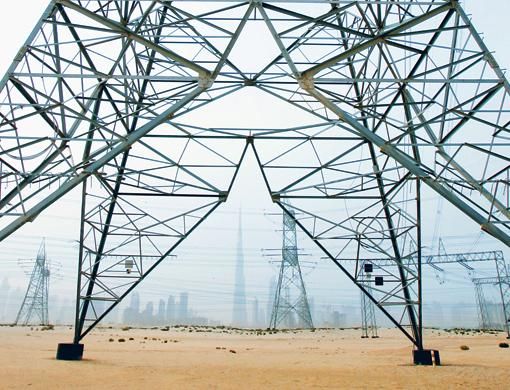Dubai: Gulf countries have taken a step towards easing a regional power crunch and supplying the flow of electricity needed by their increasingly affluent societies by linking up their grids.
Economic growth has strained the infrastructure of the world's largest oil exporters, and left them struggling to supply enough power. The downturn has slowed growth, but power supplies remain tight.
"It's an extremely important milestone for power security," said Johannes Benigni, managing director at Vienna-based consultancy JBC Energy. "Especially when the market is short, this is very powerful."
Saudi Arabia, Kuwait, Qatar and Bahrain could start seeing power flow across borders by the end of July. They signed a power trading agreement last week and have been testing grid links for months. Oman and the United Arab Emirates would be linked up later.
Cross-border trade on the $1.4 billion (Dh5.14 billion) grid project would initially be limited as only Qatar has spare power to sell. The grid's biggest immediate impact would be to lower surplus power capacity needed to guarantee supply, Benigni said.
Gulf Arab states have similar consumption patterns, with demand peaking in the summer as air conditioners run hard to counter scorching desert temperatures.
But each country's pattern would differ slightly, so while one grid strains another could provide the capacity margin needed to keep working, Benigni said.
"This link is a structure that will allow the sharing of the reserve margin in its first phase," Ali Saleh Al Barrak, chief executive of Saudi Electricity Co said.
Saudi Arabia is facing costly power outages of up to five hours a day in the industrial zone of the commercial hub of Jeddah.
Even in Qatar, power supply is tight. The world's largest LNG exporter told Kuwait last week it had no spare capacity to sell this year, although industry sources have said a potential deal between the two fell through over price. That would have been the first deal on the new grid.
Every country in the Gulf except Qatar is also short of gas, the preferred fuel for power generation, even though the region sits on some of the world's largest gas reserves.
Gulf countries instead burn oil products at some power plants and are considering gas imports, coal plants and nuclear power as ways to meet future electricity generation needs.
The Gulf power market would only mature when those issues were resolved, said Rajnish Goswami, vice president of gas and power at consultancy Wood Mackenzie.
"Initially, this will be more about political cooperation between countries rather than commercial power trading opportunities."
Some positive momentum may be created towards the end of the next decade if the UAE goes ahead with plans to develop nuclear power.













